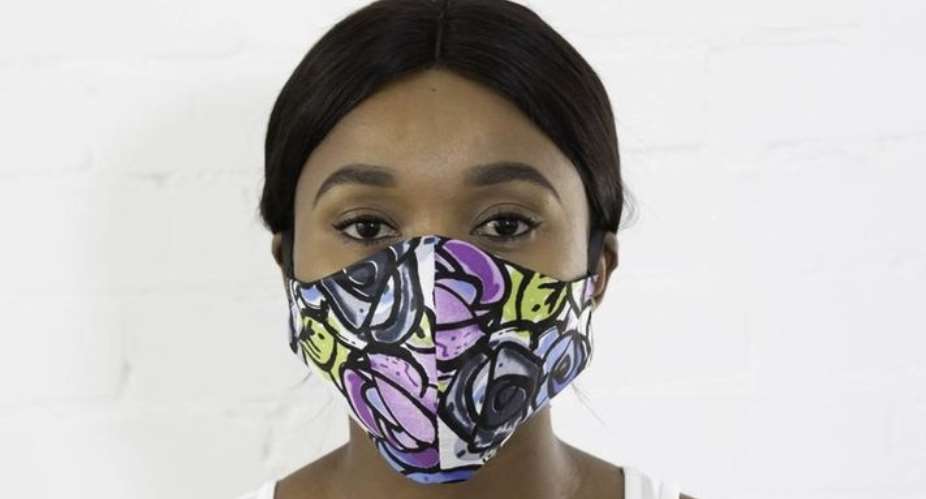The Ghana Medical Association (GMA) in the Ashanti Region has backed a decision by the Nurses Association not to wear cloth face masks in conducting their duties in hospitals.
This comes after the leadership of the Ghana Registered Nurses and Midwives Association (GRNMA) at the Komfo Anokye Teaching Hospital kicked against the use of cloth face masks by its members for clinical activities.
According to them, there is evidence to suggest that wearing those face masks can pose a higher risk of exposure to the novel coronavirus while the health workers performing their duties.
During an interview on Eyewitness News, the Ashanti Regional Chairman of the GMA, Dr. Paa Kwesi Baidoo justified their claim, saying that the cloth masks are not the best to be used by health workers on the frontline of the COVID-19 fight.
“The GMA is not against the use of cloth masks but then if you look at the evidence available, they are not recommended for use in the clinical settings. The hospital and clinical settings are not synonymous. In the hospital, we have the clinicians who are in daily contact with the patients. And even the African Centre for Disease Control and Prevention recommends that the cloth face mask can be used by the general public so as not to compete with health workers because there is much demand for them worldwide. The prices have shot up and everything but they could not recommend for use by clinicians at hospitals for work.”
“Those in the offices and outside the hospitals can use it but not the clinicians. And this is not me saying it but scientific research done as far back as 2000 even before the onset of the COVID-19,” he stressed.
Recommendations on the use of cloth face masks
The use of face masks as protective equipment against COVID-19 has been made mandatory in the country, with some authorities vowing to punish persons who are caught not wearing a mask.
The Minister of Health, Kwaku Agyeman Manu has even disclosed that government is considering plans to arrest recalcitrant persons who refuse to adhere to basic guidelines in fighting COVID-19 such as wearing of face mask in public spaces.
According to him, such persons could face a three-month jail term for not following the protocols.
Although the surgical masks are best recommended, people have taken to producing homemade masks with cloth since a lot of people cannot afford or get access to the surgical ones.
Below are the specific instructions for the cloth face masks as recommended by the Food and Drugs Authority (FDA).
Fabric and Design
•It is recommended that fabric used for face mask should be free from all chemicals.
•In any event that printed fabric is used, the layer of the fabric in direct contact with the face should be a plain fabric that is free from chemicals.
Fabric/Material Combinations
To be effective, face masks generally must be able to filter out particles and still be easy to breathe through. In the absence of propylene, which is the common material used for medical-grade face masks, 100% cotton or cotton blends possess good material characteristics for homemade face masks. Recent studies/evaluations undertaken by the FDA on viable materials for the production of effective homemade face masks from local fabrics/materials established the following:
1. Calico-Stiff (Hard/Medium)-Calico (three layers) combination is ideal for a reusable homemade COVID-19 face mask.
2. Calico-Calico-Calico (three layers) combination is ideal for a reusable homemade COVID-19 face mask.
Cleaning of Homemade Face Masks
Reusable homemade face masks should be properly washed before reuse. Used homemade face masks must first be disinfected; then washed with soap or detergent until clean, rinsed under running water; dried in the open sun, and ironed before reuse.
They should be routinely washed depending on the frequency of use or when saturated from condensation build-up from breathing, or after a contamination event.
Provide identification tags on the face masks, including the FDA Registration Number
---citinewsroom





 Former Kotoko Player George Asare elected SRC President at PUG Law Faculty
Former Kotoko Player George Asare elected SRC President at PUG Law Faculty
 2024 elections: Consider ‘dumsor’ when casting your votes; NPP deserves less — P...
2024 elections: Consider ‘dumsor’ when casting your votes; NPP deserves less — P...
 You have no grounds to call Mahama incompetent; you’ve failed — Prof. Marfo blas...
You have no grounds to call Mahama incompetent; you’ve failed — Prof. Marfo blas...
 2024 elections: NPP creates better policies for people like us; we’ll vote for B...
2024 elections: NPP creates better policies for people like us; we’ll vote for B...
 Don’t exchange your life for wealth; a sparkle of fire can be your end — Gender ...
Don’t exchange your life for wealth; a sparkle of fire can be your end — Gender ...
 Ghana’s newly installed Poland train reportedly involved in accident while on a ...
Ghana’s newly installed Poland train reportedly involved in accident while on a ...
 Chieftaincy disputes: Government imposes 4pm to 7am curfew on Sampa township
Chieftaincy disputes: Government imposes 4pm to 7am curfew on Sampa township
 Franklin Cudjoe fumes at unaccountable wasteful executive living large at the ex...
Franklin Cudjoe fumes at unaccountable wasteful executive living large at the ex...
 I'll 'stoop too low' for votes; I'm never moved by your propaganda — Oquaye Jnr ...
I'll 'stoop too low' for votes; I'm never moved by your propaganda — Oquaye Jnr ...
 Kumasi Thermal Plant commissioning: I pray God opens the eyes of leaders who don...
Kumasi Thermal Plant commissioning: I pray God opens the eyes of leaders who don...
